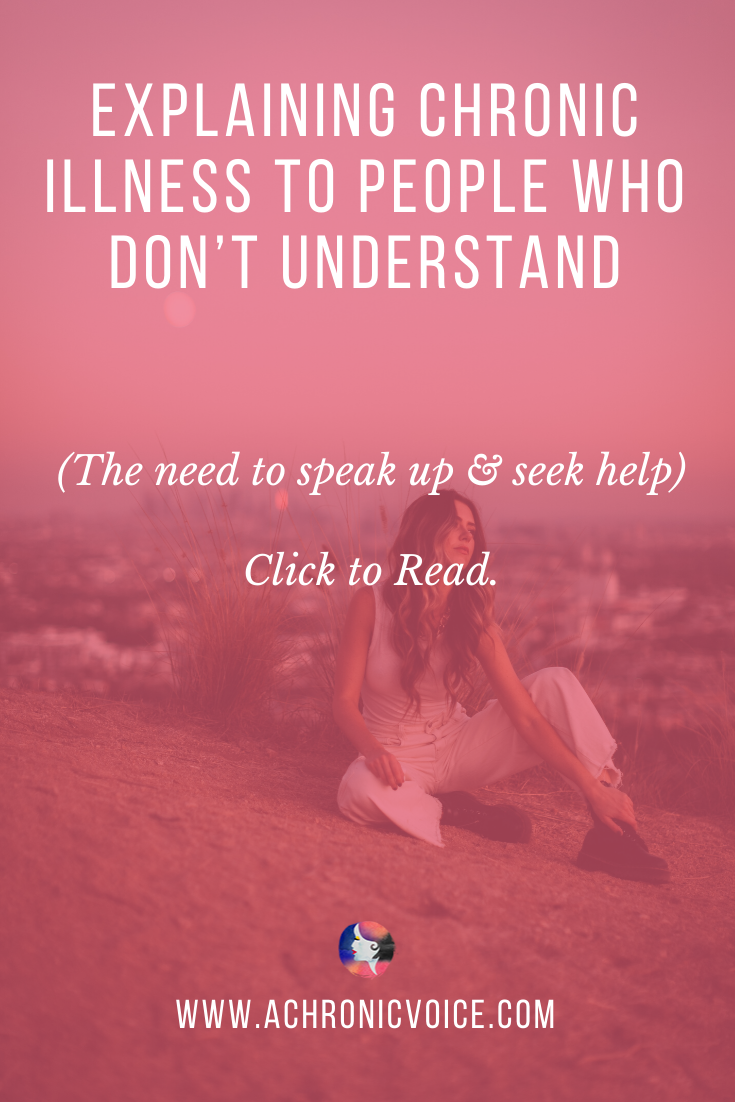*Note from A Chronic Voice: Marie makes some relatable points in this post, as many who are chronically ill often have trouble explaining chronic illness and the pain they’re in. And with the way modern society is structured, we are often guilt ridden, and feel like a burden to our friends and family. It is crucial however to set boundaries, advocate for ourselves, and ask for help that we actually need. This will not only improve the quality of our lives, but also allow our loved ones into an important journey that they often want to be part of.
Table of Contents
What is Chronic Illness?
A chronic illness is a health condition that a person experiences that’s persistent. It’s chronic, so it isn’t something that goes away. While the severity of symptoms might change for better or for worse or have ups and downs, a chronic illness typically lasts for your entire life.
Chronic illnesses can be manageable in many cases with medication, lifestyle changes, and, if applicable, nutrition supplements, or appropriate physical activity. It’s important to remember that every chronic illness is different and that even with the same diagnosis, everyone with a chronic illness experiences it differently.
There may be overlap and universal themes, but no two people are alike. If someone doesn’t have a chronic illness, they might assume that it’s like having a cold for the rest of your life, or they might not be able to grasp that it’s something with ups and downs that doesn’t go away. There are misconceptions about chronic illnesses that lead a lot of people to hide their condition because they feel that they’ll be misunderstood if they tell people about it, but for a lot of people, it’s essential to be able to explain your condition to others so that they do understand.
Short Term vs Long Term Illnesses
If you have a short-term illness, it’ll lift or heal eventually. A long-term or chronic illness, however, is a life-long condition, or it can be. Some people with a chronic illness appear ‘normal.’ You might not know what they’re experiencing because the symptoms are invisible to someone who’s looking at them. The symptoms of chronic illness ebb and flow; you might be having a good day, but the next day may not be so great.
When it comes to conditions like fibromyalgia or chronic pain, some people have bad pain days, and other days, they experience relief. You can’t assume how someone’s feeling with a chronic illness, and it’s imperative to understand that no matter how hard a person tries, they may experience symptoms that are severe and that aren’t managed by the treatment options that a person has available on any given day.
Don’t Make Assumptions About Someone with a Chronic Illness; Ask
If someone with a chronic illness says that they’re not feeling well, that they can’t go out, or that they’re too sick to do an activity, believe them. The person knows their illness better than you do. It’s crucial to respect that there are symptoms that can be pervasive. If you have a chronic illness, it’s okay to speak up and set boundaries about what you can and can’t do. What can you do to make people understand how you’re feeling? Here are some tips to help people understand you.
Be Honest
You don’t have to hide your conditions or symptoms. If you feel something, it’s more than okay to speak up and tell the people around you, “I’m experiencing this symptom,” or if it’s a mental health condition like Depression or Anxiety, “I’m feeling down, or anxious today.” If you have chronic pain, you can say, “I’m having a bad pain day.” You’re not a burden, and the people around you will start to understand more and more as you speak up about chronic illness and explain your symptoms.
Keep Your Friends Informed of What’s Happening with You
Chronic illness changes so frequently, and it’s essential to keep your friends informed about what’s going on with you. If you suffer from Depression or a long-term illness like Bipolar Disorder, you might be hesitant to talk about it or burden people, but you aren’t a burden. It’s okay to keep people updated about what’s going on, and sometimes, the trouble with chronic illnesses is that symptoms can bring people to a low point where they don’t want to reach out and isolate themselves. The more you can push yourself to reach out, the better you’ll feel.
Talk to Them About Symptom Management
One of the hardest things for people without a chronic illness to grasp is often the nuances of symptom management. There’s a tendency in our society to place blame on chronically ill people. Some people attribute health struggles to the choices that a person makes. Sometimes, you’ll take your medication regularly, exercise, and ensure that you’re getting proper nutrition, but your symptoms won’t be managed. Uninformed people might make unhelpful suggestions like, “have you tried this supplement?” or “have you tried exercising more?”. If you have a chronic illness, you’ve likely tried everything.
You didn’t ask for this, and sometimes, symptom management is a huge battle. To help people understand, set a boundary with them if they give you unhelpful advice or make comments that make you feel as though you’re not ‘doing enough’. Explain to them that having your illness means that, to some extent, symptoms are out of your control.
Mental Health and Chronic Illness: Getting Help
If you want to talk to someone who is empathetic to your chronic illness, one thing that you can pursue is therapy. Whether you work with someone online or in your local area, a mental health professional can be sympathetic to your experiences with chronic illness. You can search online for ‘a therapist near me,’ and find someone who will support you when your condition is overwhelming when you feel misunderstood, or when you feel like you can’t make it through. It’s essential to have a support system with a chronic illness, and a therapist or counselor can be a significant part of that support system.
*Note: This article is meant for educational purposes and is based on the author’s personal experiences. It is not to be substituted for medical advice. Please consult your own doctor before changing or adding any new treatment protocols.
Read More: 7 Ways to Be a Better Friend to Someone with a Chronic Illness (and 3 Things You Should Never Do)
If you liked this article, sign up for our mailing list here so you don’t miss out on our latest posts! You will also receive an e-book full of uplifting messages, quotes and illustrations, as a token of appreciation!

Contributor Bio




I’ve battled a severe anxiety disorder since I was 5 years old…possibly younger. I’m now 58 years old. When I recently told some family members I’ve now had the disorder for 53 years their responses were so disappointing. If you told someone you’ve been cancer free for 10 years, or mentioned some other significantly long “anniversary” of survival you’d likely get hearty congratulations. But I got “Oh well…” and other disinterested responses. No one sees my decades of battling my disorder as courageous. My goal has always been to survive each single day at a time. My mantra when having a bad day is to say “And this too shall pass. And for me, it helps. Mentally ill people are often expected to behave as if they don’t have a mental illness. Some family members think it’s something you can just set side when it’s inconvenient. Recently I moved into a new apartment one floor below the one I had originally rented. I’m 100 lbs overweight and have a very bad back so I told my oldest sister I would need her and her husbands help. I told her that she had 2 months notice to arrange to take the day off. Just 2 days before the move she bailed on helping me move. I did the move alone (except for furniture) and it literally almost destroyed me. It took 12 hours on the first day and 10 hours on the second day. I woke up the night of the 2nd dy with flop sweats and tingling in my hands like they were falling asleep.That tingling lasted days. I clearly pushed my body beyond it’ safe limits. Why do I mention this? Because I found out my sisster never asked for the day off, and never asked her husband to help. She abandoned me on purpose. Why? To teach me a lesson! It was to teach me to be more responsible and a better housekeeper. (I’m not the best) It’s really about my disorder, se wants me to act more “normal”.
I am so sorry to hear that, Peter 🙁 I hope you find some online supportive communities, there are quite a number out there and it’s good to meet people who actually understand what you’re going through, and believe you. I think family or friends who are unsupportive should be gently educated where possible, but if they refuse to be supportive of your struggle and journey, then I would personally take care of my self first and toss such toxicity aside. Note that these are just my thoughts – your situation and thoughts might be entirely different so please don’t take it as advice 🙂